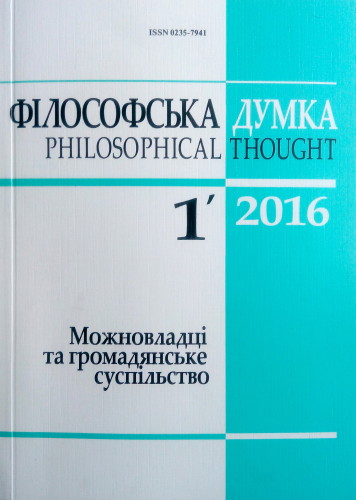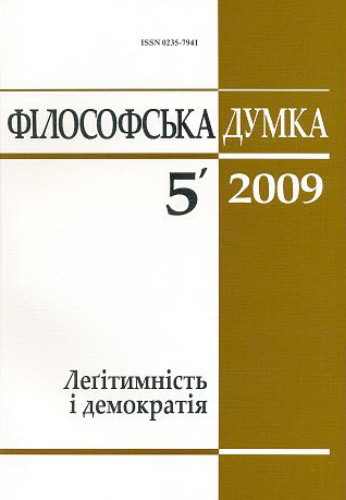Institute of Philosophy of the National Academy of Sciences of Ukraine
Institute of Philosophy of the National Academy of Sciences of Ukraine (Інститут філософії Національної академії наук України; Instytut filosofii Natsionalnoi akademii nauk Ukrainy). Principal center for philosophical studies in Ukraine, founded in Kyiv in November 1946 to conduct and co-ordinate research in philosophy and to prepare specialists in the field. In the 1920s and 1930s some work in philosophy was done at the All-Ukrainian Academy of Sciences by the Historical-Literary Society of the historical-philological division, the Chair of the History of Philosophy and Law in the social-economic division, the Chair of Marxism-Leninism, and the Commission of Philosophy. In the Soviet times in the early 1980s the scientific research institute had 13 departments, some of which had little to do with philosophy: dialectical materialism, historical materialism, philosophical questions of scientific communism, history of philosophical and social thought in Ukraine, logic of scientific knowledge, philosophical questions of the natural sciences, esthetics, scientific atheism, contemporary philosophy abroad, theoretical problems of ethnic relations and proletarian internationalism, philosophical problems of social psychology, sociological research on labor and on social and professional guidance, and sociopsychological problems of management.
As of 2017 the institute has 8 departments: logic and methodology of science; philosophical anthropology; philosophical problems of natural sciences and ecology; social philosophy; philosophy of culture, ethics, and esthetics; history of philosophy in Ukraine; history of philosophy abroad; and philosophical problems of ethnicity and nationality. It also includes a section of religious studies. The institute employs 104 scholars, including one academician and one corresponding member of the National Academy of Sciences of Ukraine, 29 doctors and 69 candidates of sciences.
In the 1960s to 1980s there has been a strong emphasis on research with an immediate practical application in education, the economy, or the building of a communist society. Its most important and interesting philosophical contributions were in the fields of philosophy of science and the history of philosophy in Ukraine. Among the leading specialists in the first area were Mykhailo Omelianovsky, Pavel Kopnin, Petro Dyshlevyi, and Myroslav Popovych, and in the second area, Danylo Ostrianyn, Valeriia Nichyk, and Isai Tabachnikov. The institute’s publication of scholarly editions of the collected works of Hryhorii Skovoroda (1961, 2nd edition 1973) and the translated works of Teofan Prokopovych (1979–81), and some textbooks from philosophy courses given at the Kyivan Mohyla Academy in the 17th and 18th centuries, have had a lasting significance for the history of philosophy. In 1973 it published the first Ukrainian Filosofs'kyi slovnyk (Philosophical Dictionary). Besides monographs, collections of essays, and pamphlets, the institute published annually Naukovi zapysky Instytutu filosofiï (7 vols, 1951–61) and continues to publish the Ukrainian-language bimonthly Filosofs’ka dumka (since 1969), predated by journals Prapor Marksyzmu (1927–30), Prapor Marksyzmu-Leninizmu (1931–3), and Pid Markso-Lenins’kym praporom (1934–6).
Since the late 1980s–early 1990s the institute has significantly broadened the areas of philosophical inquiry and become one of the leading intellectual venues in Ukraine. Specifically the history of philosophy in Ukraine has received a renewed attention from the institute’s scholars, among them Lesia Dovha, Myroslav Popovych, Yaroslava Stratii, Volodymyr Lytvynov, Valeriia Nichyk, Olena Syrtsova, and Iryna Valiavko. The institute’s scholars have also compiled, edited, and translated the major theological and philosophical writings of Ukraine’s most prominent thinkers ranging from Ukrainian humanist thought (Ukraïns’ki humanisty epokhy Vidrodzhennia: Antolohiia [The Ukrainian Humanists of the Age of Renaissance: An Anthology], 1995) to early modern Ukraine’s major Orthodox theologians, such as Innokentii Gizel (Inokentii Gizel', Vybrani tvory u 3-kh tomakh [Selected Works in 3 volumes], 2009–11) and Petro Mohyla (V. Nichyk, Petro Mohyla v dukhovnii istoriï Ukraïny [Petro Mohyla in the Spiritual History of Ukraine], 1997) to the nineteenth century legal philosopher Pamfil Yurkevych (Pamfil D. Yurkevych, Istoriia filosofiï prava. Filosofiia prava. Filosofs'kyi shchodennyk [A History of the Philosophy of Law. The Philosophy of Law. A Philosophical Notebook], 2001).
The institute’s main periodical is Filosofs’ka dumka (since 1969). Other periodicals include the quarterly Praktychna filosofiia (59 volumes, 1999–2016); biannual Filosofs’ki obriї (36 volumes, 1999–2016), almanac Mul’tyversum. Filosofs’kyi al’manakh (148 volumes, 1998–2015), and the monthly Relihiina panorama (128 volumes, 2000–2011) among others. The institute’s directors have been Mykhailo Omelianovsky (1946–52), Danylo Ostrianyn (1952–62), Pavel Kopnin (1962–8), Volodymyr Shynkaruk (1968–2001), Myroslav Popovych (2001–18), and Anatolii Yermolenko (since 2018).
BIBLIOGRAPHY
‘Instytutu filosofiï Natsional'noï akademiï nauk Ukraïny – 50 rokiv!’ Filosofs’ka dumka, nos. 4–6 (1998)
Serhiy Bilenky, Taras Zakydalsky
[This article was updated in 2020.]

